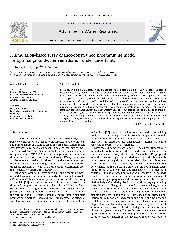摘要
In this study a simulation-based fuzzy chance-constrained programming (SFCCP) model is developed based on possibility theory. The model is solved through an indirect search approach which integrates fuzzy simulation, artificial neural network and simulated annealing techniques. This approach has the advantages of. (1) handling simulation and optimization problems under uncertainty associated with fuzzy parameters, (2) providing additional information (i.e. possibility of constraint satisfaction) indicating that how likely one can believe the decision results, (3) alleviating computational burdens in the optimization process, and (4) reducing the chances of being trapped in local optima. The model is applied to a petroleum-contaminated aquifer located in western Canada for supporting the optimal design of ground-water remediation systems. The model solutions provide optimal groundwater pumping rates for the 3, 5 and 10 years of pumping schemes. It is observed that the uncertainty significantly affects the remediation strategies. To mitigate such impacts, additional cost is required either for increased pumping rate or for reinforced site characterization.
